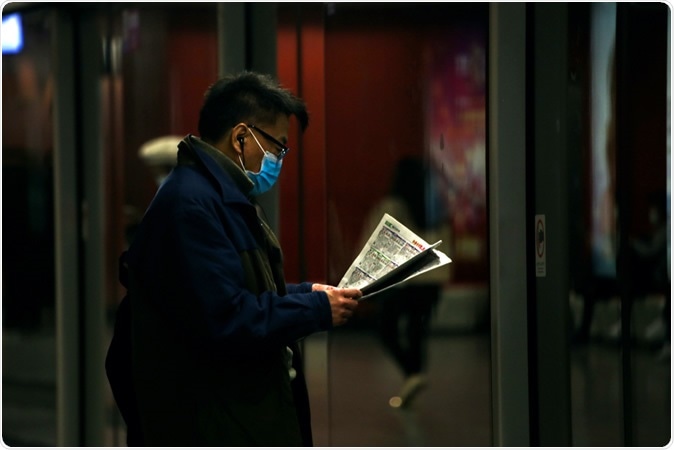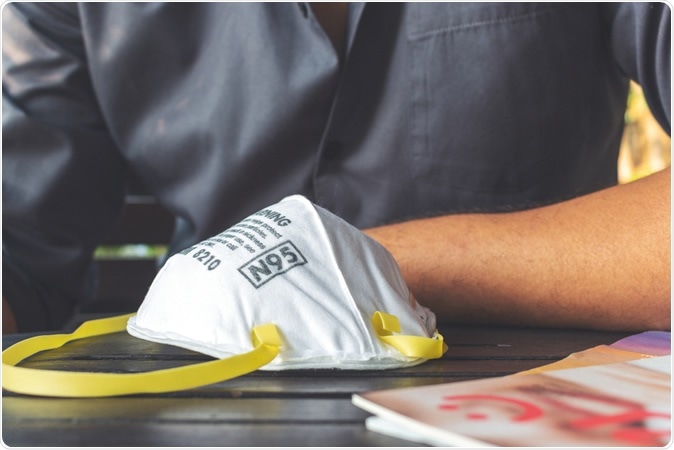As the new Wuhan coronavirus, designated 2019-nCoV, spreads around the world, people are increasingly turning to face masks for protection. The question is, are masks really needed?
8,100 people globally have fallen sick and officials say over 170 have died, mostly the old and sick. Cases have cropped up in 15 countries all over the world. Even people in the USA, half a world away from China where the epidemic is raging unabated, have started to wear face masks. According to an article published in the New England Journal of Medicine, the number of infections reported in Wuhan has doubled every 7.4 days on average.
Health experts say that in the USA, at any rate, the risk of infection is very low, seeing that there have been only 5 confirmed cases in 4 states so far, all of which were in individuals who had travelled to China in the recent past. Person-to-person transmission has not yet been seen to occur in this country so far. However, if anyone is scared about the virus because they live near a confirmed case, or if their locality is having severe flu season, a face mask could help prevent the flu at least. And in the case of elderly or sick people, who seem to be the target for this virus, a flu shot, and a face mask could be just what the doctor ordered to help prevent both conditions.

Hong Kong - January 29, 2020: A man wearing a surgical face masks reads the newspaper while waiting for the MTR. A rise in face masks followed reports of the Wuhan Coronavirus in Hong Kong. Image Credit: Katherinekycheng / Shutterstock
Why face masks?
Both the novel coronavirus and other coronaviruses like SARS and MERS are spread through airborne droplets created through coughs and sneezes, which reach the lungs either through the air or by contaminating surfaces which are then touched with a hand that is then brought to the nose or mouth.
In the very similar SARS outbreak, also of Chinese origin, face masks protected against 80% of flu-like illnesses provided they were worn all the time when needed. However, less than half of people in that study actually wore it as they should have. Both surgical masks and the P2 type had the same protective effect.
CDC recommendations for health workers dealing with novel coronavirus patients is to wear N95 masks that fit the face closely and don’t allow much air to percolate unfiltered through the sides. It filters out 95% of particles sized 0.3 micrometers or larger. However, coronaviruses are on average about 0.1 micrometers in size, which means they could slip through. Beards and hair also prevent the mask from fitting well. This could also be the case with children, while people with breathing difficulties could find it hard to tolerate these masks.
Ordinary surgical masks could be pretty useless as they are too loose to keep out unfiltered air. Cloth masks may absorb moisture and thus promote bacterial breeding, encouraging respiratory infections. Some previous studies show that respirator masks like the N95 do keep out fluorescent spray.

N95 air filter mask. Memory Stockphoto / Shutterstock
To add to the controversy, there are conflicting opinions on how to wear face masks properly to keep out or keep in germs, depending on whether the wearer is healthy or sick. Health authorities say the only way to wear a mask the right way is to have the colored side facing out and the white side towards the face. This is because the colored side is waterproof, keeping out moisture, while the white side is absorbent, to keep the moisture-laden air containing the germs from the lungs from passing out to infect other people. Says one nursing expert’s post, “When wearing face masks in order to protect oneself from infections, make sure the white part is facing the face and the blue panel is facing out.” And this is really the whole function of a face mask – it wasn’t designed to keep out viruses in the air.
Sensible precautions
With the current craze for masks, many sellers, both in real-time and online, have sold out their entire stock and shortages are now routine around the locations where cases were confirmed. Companies like 3M have, in response, increased their production. Only people who are infected, think they may be infected, and those who stay with them or care for them, need face masks, according to the CDC.
So what is the best thing to do?
Experts say non-medical personnel don’t even need masks, and even medical people only need them for this purpose if they’re taking care of novel coronavirus patients. The Australian government has made it mandatory for doctors, other medical staff and patients to wear masks during consultations and will use its own stockpile of masks if medical staff find it impossible to get as many as are needed. Other than this, only patients who are sick need masks, it says.
Masks would be useful even in other situations, like sick people who keep coughing, or feel really ill, whether it is a novel coronavirus infection or a bad case of the flu. The purpose of asking these patients to wear masks when they are in public spaces, a doctor’s office or an emergency room is to keep others from being infected. For ordinary people, it isn’t harmful, in most cases, but won’t be of much help, say most health experts.
Sure, there’s nothing wrong with wearing a mask, as long as it doesn’t lull you into a false sense of security so that you neglect to follow the proven and most effective ways to protect your health, namely:
- Frequent and meticulous handwashing with soap and hot water
- Avoid touching eyes or face
- Eat well-cooked food
- Maintain good immunity by healthy sleep, food and exercise habits
- Keep away from suspected cases
Sources:
Early Transmission Dynamics in Wuhan, China, of Novel Coronavirus–Infected Pneumonia List of authors. Qun Li, M.Med., Xuhua Guan, Ph.D., Peng Wu, Ph.D., Xiaoye Wang, M.P.H., Lei Zhou, M.Med., Yeqing Tong, Ph.D., Ruiqi Ren, M.Med., Kathy S.M. Leung, Ph.D., Eric H.Y. Lau, Ph.D., Jessica Y. Wong, Ph.D., Xuesen Xing, Ph.D., Nijuan Xiang, M.Med., et al. - https://www.nejm.org/doi/full/10.1056/NEJMoa2001316
3M is boosting production of face masks as demand skyrockets due to the coronavirus outbreak - https://www.businessinsider.com.au/3m-boosts-face-mask-production-amid-coronavirus-demand-2020-1?r=US&IR=TInterim Guidance for Preventing 2019 Novel Coronavirus (2019-nCoV) from Spreading to Others in Homes and Communities - https://www.cdc.gov/
Novel Coronavirus 2019 (2019-nCoV) CDNA National Guidelines for Public Health Units - https://www.health.gov.au/